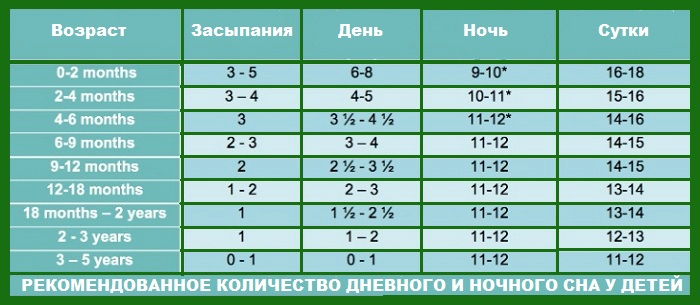From the 1st to the 12th week of his life, the child adapts and gets used to the world around him, to rhythms and time, and parents need to know how much their baby should sleep. Focusing on the norms of sleep, mothers can determine whether the crumbs have the right regimen, or the child is sick.
How much should a baby sleep in the first week of life?
Newborn sleep pattern
In the first days of his life, the baby only sleeps and eats. He does not have a strict sleep schedule, as the newborn gets used to the time of the world around him.
As a rule, the child sleeps from 18 to 20 hours a day. This time is enough to restore strength and energy that the baby spends on learning. outside world, as well as for the development of all body systems.
Phases and duration of sleep of a newborn 1 week of life
Newborn babies sleep for almost a day. At the same time, they wake up every 2-3 hours to eat.
Those babies who are breastfed can wake up after 1.5 hours. After all, breast milk takes 75 minutes to digest.
During the day, a child needs 9 hours of sleep, and at night he needs from 10 to 11 hours to rest.
Causes of restless sleep in a newborn in the first week of life
Night at the kid of this age comes at 21 o'clock and comes to an end at 9 in the morning. It is during this period that the newborn should sleep soundly. But do not forget, it needs to be fed 3-4 times a night.
Day and night sleep patterns can be disturbed if the room is stuffy.
You need to ventilate the room.
Also, in order for the baby’s sleep to be strong, it is necessary. He should be comfortable, warm, but not hot.
How much should a baby sleep in the second week from birth?
Sleep schedule for 2 week old baby
A two-week-old baby sleeps from 18 to 20 hours a day. During this time it grows. His body develops, all systems begin to adapt, mainly the nervous one. In addition, during sleep, energy appears that the child spends on learning about the world around him.
Phases and duration good night in infants of the second week of life at night and daytime
During the day, a newborn sleeps from 8 to 9 hours, and at night - from 10 to 11. His sleep is interrupted in order to eat.
Note that babies wake up after 1.5-2 hours. And those children who are fed mixtures can sleep up to 3 hours.
Why does a child sleep poorly or not sleep in the second week of life?
A baby can sleep poorly for several reasons.
- Firstly he might get hot. Keep him warm under the covers. And to make it cozy, try to swaddle the baby.
- Secondly influenced by the room temperature. To keep the room from being stuffy, it should be ventilated.
How and how much do newborn babies sleep in the third week of life?
Sleep and wakefulness in infants at the age of three weeks
At this age, children begin to show activity. They can consciously move their hands, raise their heads for a few seconds and look at an object of interest for a long time. Moreover, children wake up before the allotted time calculated for feeding, and go to bed not immediately after eating, but later.
To gain strength, kids need 18 hours a day of sound sleep.
Phases and duration of sleep in a newborn three weeks of life at night and during the day
A three-week-old baby sleeps steadily during the day for 8 hours, and at night 10. At the same time, he wakes up every 2-3 hours to refresh himself and examine the external situation.
Many mothers notice that babies have the strongest sleep from 11 pm to 9 am.
Why does a baby sleep poorly at the age of 3 weeks of life
The baby may not sleep due to the fact that he feels discomfort.
- For example, he might be hot.
Usually babies are swaddled and covered with a blanket on top. To check if the baby is hot, you should stick your finger behind the collar. If the back does not sweat, then everything is normal.
- Also, the baby may be cold.
You can check this by a frozen nose.
- By the way, the stuffiness in the room also prevents you from falling asleep.
How much does a baby normally sleep in the fourth week after birth?
Features of daytime and nighttime sleep in infants of four weeks
In a month, the child already begins to understand what day and night are. He has a sleep pattern.
In total, the baby rests 18 hours a day. This time is enough for the growth and development of the body, as well as to restore the energy spent on the knowledge of the new world.
Sleep duration and phases of a four-week-old newborn
Already in a month, the crumbs form 4 daytime periods of sleep, and one nighttime.
In total, babies sleep 8 hours a day. This time is divided into two morning periods of 3 hours, and two evening superficial sleep - 30-40 minutes each.
Many mothers have noticed that their children sleep 4 times for 2 hours. This habit negatively affects the psycho-emotional state of the child.
At night, children sleep for 10 hours.
Sleep disturbance in a newborn 4 weeks of life: the main causes
A newborn may not sleep for several reasons.
- Firstly , he may be disturbed by an external stimulus such as music or conversation. It is advisable to monitor the surrounding factors.
- Secondly , the child may be cold or hot. It needs to be swaddled so that it feels comfortable.
- Thirdly may affect sleep room conditions such as stuffiness or humidity. Be sure to ventilate the room before going to bed.
How do newborn babies sleep in the fifth week of life?
5 week old baby sleep chart
A child of this age sleeps 18 hours a day. This time is enough to replenish the reserves of strength and energy.
A five-week-old baby needs more parental attention, as he can be awake up to 3-4 hours daily.
In addition, the baby adheres to 4 naps during the day and 2 naps at night.
Duration and sleep phases of infants at 5 weeks of life at night and daytime
During the day, the child's sleep is divided into 4 periods, and is 8 hours.
As a rule, in the first two daily periods, the baby sleeps for 3 hours, and in the last two evening periods - for 30-40 minutes. This time is enough to get enough sleep and “not go” into a deep sleep.
At night, mothers can already sleep more peacefully, since within 10 hours the child will need to be fed 1-2 times.
Why does a baby sleep restlessly or not sleep at all at 5 weeks?
- Stuffy rooms are a common cause of poor sleep. Before laying down the child, it should be ventilated.
- Also, the baby may not sleep because of an uncomfortable pillow or duvet. It is advisable to check if it is not hot or cold for him.
- And the cause of restless sleep can be pain in the abdomen. They appear due to the fact that a nursing mother ate a product that she had not used before.
How much should a baby sleep in the sixth week of life?
The sleep pattern of a six-week-old baby at night and during the day
By 6 months, the newborn develops a stable sleep and wakefulness pattern.
During the day, the child continues to sleep 4 times. And at night it can be interrupted 1-2 times for feeding.
In total, the baby sleeps 18 hours a day. This time is enough to gain strength and start learning again the world.
At this age, the child already independently holds his head in an upright position, follows objects by turning his neck.
How much should a baby sleep at 6 weeks in time?
Daytime sleep crumbs is divided into 4 periods and is 8 hours. The baby needs two deep sleeps of 3 hours and two superficial sleeps of 30-40 minutes.
BUT night sleep child is limited to 10 hours. At the same time, it can also be divided into 2-3 periods, since the child must be fed at night.
Why does a 6 week old baby sleep restlessly at night/day?
- The most common cause of poor sleep in a child of this age is incorrect sleep associations. That is, he can wake up at night, cry and fall asleep only after he is shaken or picked up.
- The baby may wake up from shuddering. Swaddling saves them.
- By the way, stuffiness in the room or illness can also become the causes of poor sleep.
How much sleep should a child of seven weeks from birth normally sleep?
Sleep pattern in children at seven weeks of age day and night
At 7 months, the child begins to show himself energetically.
Parents should accustom him to active games in the morning, and to quiet activities in the afternoon. Then the baby will sleep well.
For a child of this age, 18 hours of sleep is enough for a day. If your child sleeps longer, then he may not feel well.
From the mode of sleep and wakefulness, the baby should not be unlearned.
How much and how should a baby sleep at 7 weeks?
The daytime sleep of a 7-week-old baby is no different from a 6-week-old baby.
Rest is divided into 4 periods: 2 for 3 hours and 2 for 30-40 minutes.
It is desirable that the first periods of deep sleep take place in the first half of the day, and the second superficial periods in the evening.
In just a day, the baby can sleep up to 8 hours. And he needs 10 hours for a night's rest.
Why does a child sleep poorly at night and during the day at seven weeks of life: reasons
We wrote about active games above, they should take place during the day.
And another reason for poor sleep is an uncomfortable pillow or mattress. Since the baby is already starting to move, then, of course, he can crawl during sleep and lie down as he wants.
In this problem, swaddling saves parents. Wrapped up in a warm blanket, the child will not want to crawl anywhere and move.
By the way, swaddling also prevents the baby from shuddering.
How much does a newborn baby sleep at the eighth week of life?
Sleep schedule for children at eight weeks of age during the day and at night
The sleep regimen in children of 8 weeks does not differ from the regimen of babies of 5,6,7 weeks. As a rule, they need 18 hours a day to rest.
Toddlers can already hold their heads upright or lying on their stomachs.
In addition, children already distinguish between the concepts of day and night.
Sleep phases and duration in an 8 week old baby
At this age, babies sleep at night for 10 hours. Moms get up to them only 1 time to feed and swaddle.
And during the day, children have 8 hours of sleep. It is divided into 4 periods: 2 deep sleeps of 3 hours and 2 superficial sleeps of 30-40 minutes.
Sleep disturbance in a child at 8 weeks of age: causes
As a rule, at this age the baby sleeps peacefully. But if he is disturbed by an external stimulus, voice or music, he will wake up.
- Also, the cause of poor sleep can be a disease. When a child is ill, he will not sleep.
- In addition, if he is hot or cold, the child may begin to cry.
- And the stuffiness in the room can also be the cause. Ventilate the room half an hour before bedtime.
How and how much does a baby sleep in the ninth week of life?
Proper sleep schedule for children 9 weeks of age
A stable 4-day rest is also maintained in 9-week-old children. But in time it decreases by 1 hour.
A night's sleep does not change. In total, babies need 17 hours to rest.
They need strength in order to study the world around them, learn to keep their heads straight and lean on their forearms, lying on their stomach, and also to turn on their side.
How much sleep should a child have during the day and night?
The duration of a child's daytime sleep changes by 1 hour and is 7 hours.
In addition, the child sleeps 4 times a day: 2 deep sleeps for 2-3 hours and 2 superficial ones for 30-40 minutes. As a rule, the first pass before lunch, the second after.
And the night time does not change. The baby needs 10 hours of sleep. Of course, at night, mommy will have to get up 1 time for feeding.
Why does a 9 week old baby sleep poorly during the day or at night?
- To ensure that the child sleeps soundly, wrap him in a soft warm sheet, and then cover him with a blanket (in case the room is cold).
- Pay attention to external stimuli - music, radio, TV. Disable them.
- Before putting the child to bed, ventilate the room, suddenly it will be stuffy.
- And, of course, teach your baby to fall asleep on their own. He doesn't have to wake up to feel your hands or wiggle.
- By the way, the cause of poor sleep can be pain in the abdomen and other diseases.
How should a baby sleep at the tenth week of birth?
How much sleep should a child sleep at night and during the day?
As soon as the baby's viewing area has increased due to the fact that he has learned to hold his head while lying on his stomach, he begins to follow the surrounding objects.
In order for the crumbs to have a lot of strength and enough energy for 7 hours of daily wakefulness, he must sleep at least 17 hours a day.
The duration and phases of sleep in a child at the age of 10 weeks
The daytime sleep of the baby is divided into 4 periods, of which 2 deep sleeps of 2-3 hours and 2 superficial sleeps of 30-40 minutes. It is desirable that the first fall on the day, and the second on the evening.
Babies need 10 hours for a night's rest. During the night, a mother can disturb her child 1 time to feed.
Why the child cannot sleep during the day or at night, what worries him?
Often the cause of sleep disturbance is abdominal pain. The mother of the baby must watch what she eats. child on artificial feeding can be converted to another mixture.
Also, a child may not sleep well due to an uncomfortable mattress, a hot blanket, a stuffy room, or simply hunger.
How much sleep should a baby sleep in the eleventh week of life?
Sleep patterns in children aged 11 weeks of life at night and during the day
The sleep schedule of a child at this age hardly changes. The baby should sleep 16-17 hours a day.
He "walks" a little longer than usual, and can sleep less during the day. In addition, 4-time daytime sleep is maintained. It is necessary for the child to have the strength for active games.
Sleep phases and duration in an 11 week old baby
In children of this age, daytime sleep is divided into 4 periods. Babies sleep 2 times in the morning for 2-3 hours and 2 times in the afternoon for 30-40 minutes. Note that the night regimen in children of 11 weeks does not change, it is 10 hours. You can also feed 1 time per night.
Why does a child at 11 weeks of life sleep poorly during the day or at night: reasons
Overwork can be the cause of sleep disturbance. The baby can overwork, lying on his stomach, holding his head. Also, overwork will appear due to muscle tension, because a child at this age will try to crawl to toys and turn on its side.
Also, poor sleep can be caused by hunger, stuffiness in the room, a hard mattress, an uncomfortable pillow, heat, cold, nighttime tremors, or illness.
Sleep of children at the twelfth week from birth
Features of daytime and nighttime sleep in infants 12 weeks
By three months, the child should learn not only to hold his head, but also to move it to the sides: up, down, right, left. He should also lean on his forearms, lying on his stomach, and turn on his side.
In order for the baby to be in a good mood and have enough strength and energy to develop his own abilities, he will need 16-17 hours of sleep.
At the same time, his 4-time daytime sleep should also be maintained.
Sleep phases and duration in children 12 weeks of age
Many mothers notice that a baby's sleep at 3 months does not last more than 4 hours in a row.
Despite this regime, daytime rest takes place in 4 periods. Kids sleep 2 times for 2-3 hours in the first half of the day, and after dinner 2 times for 30-40 minutes. The norm of daytime sleep for a child of 12 weeks is 6-7 hours.
And the night schedule of the crumbs does not change, he needs 10 hours for sleep. In this case, the child can oversleep all night and not wake up to eat.
Causes of Poor Sleep in Babies at 12 Weeks
- By this age, babies should be sleeping on their own. They do not need to be rocked or picked up. The baby will not be able to sleep if the parents have changed their motion sickness tactics.
- Sleep can also be disturbed due to illness, often children have a tummy ache.
Also, the causes of poor sleep are stuffiness or humidity in the room, cold, heat, uncomfortable bedding (pillow, mattress, blanket), external stimuli (music, TV, voice, telephone).
After the birth little man The life of young parents changes dramatically. Now in the first place in their lives is that little treasure that was conceived nine months ago. The first baby in the family is a joy for the newlyweds, and the second and third are boundless happiness.
In addition to happiness and joy, extraordinary dreams appear that mom and dad did not even think about before. This dream lies in the desire to sleep off, since almost every newborn baby does not sleep well at night. But here it is worth noting that this phenomenon is absolutely normal. But how long should a baby sleep? And, in general, how much does a newborn baby sleep?
Each baby is characterized by its own individuality, even if the children are twins, they still have different tempers. So with sleep, one child needs a lot of sleep, and the other less. Why is that? Everything depends on the physiological structure of the brain, through which each child has its own distinctive features, habits, and characteristics. There are times when the little one sleeps all night for about 7-8 hours. This is wrong, since his body needs food, and if it does not arrive on time, then this threatens to cause various deviations.
If the baby is breastfed, then on average he should sleep no more than 16-20 hours a day. The rest of the time - wakefulness, feeding. Every 2-4 hours, the newborn wakes up to eat.
In case of untimely waking up for feeding, dehydration of the body may occur. Dehydration progresses to hypoglycemia and jaundice. To prevent this, it is necessary to feed the babies often (every 2-4 hours).
Reasons why a newborn sleeps for a long time:
- Difficult childbirth. If the birth was difficult and protracted and, accordingly, pharmacological preparations were used, then children can sleep almost soundly.
- With improper breastfeeding. If the baby takes the breast incorrectly, then they experience rapid fatigue. A tired baby simply falls asleep and sleeps for a long time. The situation must be corrected by contacting a doctor.
- Rough nipples. If the mother has rough nipples, then it is extremely difficult for the child to suck them out. He gets tired very quickly, malnourished and falls asleep. Sleep lasts a long time, and it is based on fatigue.
Sleep duration per day

The average sleep time for newborns is 16-20 hours per day. This time is enough for the child to sleep and digest food. Naturally, every 2-4 hours he wakes up in order to eat. Since the baby has a small stomach, and milk is quickly digested, the body also requires frequent meals.
Of course, almost no one counts the time at which the baby sleeps, but it really falls within the limit. The only exceptions are children with signs of anxiety: colic, fever, etc. Such factors lead to a decrease in the duration of sleep, which affects the psyche. Thus, the baby must sleep for a certain time per day, but if this norm is not maintained, then pathologies or deviations occur.
Night sleep
At night, the baby should sleep for about 8 hours, but with awakenings for feeding. Babies often wake up on their own when they need food. If the mother is nearby, then the little one practically does not have to wake up, and if he sleeps in the crib, then the parents will hear a signal in the form of crying.
Mean sleep durations for newborns

It is known that with each month of life, children become older, sleep time is reduced, and wakefulness increases. During sleep, the baby grows, so the longer the sleep, the better it is for his health.
The average data on the sleep time of the baby:
- In the first month, the duration is 16-20 hours a day;
- In the second month - 14-16 hours a day;
- Upon reaching the age of six months, the duration of sleep decreases to 10-11 hours a day;
- He should sleep about 9-10 hours a year.
Often there are also dormouse that can sleep longer than the specified standard framework, but such cases are quite rare. Most often, children are more inclined to the opposite.
When sleep starts all night
Many parents are interested in this question: “When does the child start sleeping through the night?” Enough interest Ask because parents are looking forward to this time. So, children can breastfeed until two or even three years of age. They breastfeed, both day and night, and the only way to increase the duration of sleep is to wean the baby from the breast. Many try to wean children from a year, and someone feeds for three years. Both options cannot be condemned, since this is a personal matter for everyone. But here it is worth noting that when the baby is still suckling, he will wake up at night at any age. Milk is a rapidly digestible product that is absorbed by the body. When the milk is processed, the stomach will send a signal to the brain and the baby will wake up.

When the mother weanes the child from the breast, he begins to eat more high-calorie food, which is enough for the body to break down until the morning. Thus, a baby from a year begins to sleep soundly all night, provided it is from teaching, from the chest. If not, then this time is extended to two years.
How else to teach your baby to sleep through the night
Top tips for getting your little one to sleep through the night:
- Putting to bed at the same time. You can teach a baby to sleep only by observing the time regimen. So, he will know that after buying and doing gymnastics, he must go to bed.
- It is possible to accustom children to sleep all night, provided they are full. When the baby goes to bed hungry, he may not fall asleep, and if he falls asleep, he will wake up after a few hours. At night, you can feed the baby with light yogurt (low-fat).
- You can also teach to sleep all night by turning on the lamp at night. Children, waking up at night, may be frightened, and the warm illumination from the lamp will attract their attention.
- Another factor that will help teach a child not to wake up at night. After the baby is deprived breastfeeding, he must be put to sleep in his crib. He will not smell milk, and sleep peacefully until morning. Weaning from the breast is not recommended earlier than one year.
Sleep duration between feedings
From the first days of life, feeding of the newborn begins. When and how sleep occurs in infants is already known. It is also known that every 4 hours the baby must wake up in order to eat. This means that the sleep time between feedings is from 2 to 4 hours. If the baby fell asleep while eating, then he can sleep through the night.

If the child does not want to breastfeed after 3-4 hours, it is necessary to check the temperature and conduct an external examination. Most likely, the duration of sleep and loss of strength indicates a manifestation of the body's malaise.
Proper sleep for a newborn
How should a newborn sleep properly? If you properly position the baby in the bed, then he can oversleep for a long time. But it depends not only on the subject of the interior. The main factor is the atmosphere in the room and the atmosphere of the attitude of the parents. If you properly set up the child for sleep, then he can even fall asleep on his own, but for this you will need:
- Before a night's sleep - a ritual: bathing, massage, gymnastics and games.
- During daytime sleep - entertainment, communication, games, stories - all this will cause a surge of emotions in the crumbs, which will affect the psyche. In this case, the baby will exhaust his strength and fall asleep for a long time.
How much should a newborn baby sleep between feedings? It's pretty frequently asked question pediatrician from young parents dreaming of sleep. The baby needs to be fed day and night. It turns out that his mom and dad don’t have time for sleep at all. But for those whose baby sleeps for a very long time, you should not rejoice. Such a dream threatens to dehydrate the body.
Why does the baby sleep for a long time?
A baby who has just been born sleeps really a lot. The average duration of his sleep is from 15 to 20 hours a day. But one should also take into account the nuance that sleep must necessarily be interrupted for feeding. Between meals, ideally, no more than 1.5-2 hours pass.
 Since the baby's stomach has a small volume, it needs to be fed little, but often. Breast milk very quickly absorbed by the body of a newborn, and therefore its reserves must be replenished in time. If a child sleeps for more than 5 hours in a row, this means that he does not have enough food, and therefore vitality, or he is sick. In this case, you should measure the baby's body temperature and, if necessary, immediately consult a doctor.
Since the baby's stomach has a small volume, it needs to be fed little, but often. Breast milk very quickly absorbed by the body of a newborn, and therefore its reserves must be replenished in time. If a child sleeps for more than 5 hours in a row, this means that he does not have enough food, and therefore vitality, or he is sick. In this case, you should measure the baby's body temperature and, if necessary, immediately consult a doctor.
You should also take into account the fact that after using strong medications during childbirth with complications, the baby can also sleep for a long time. This is due to the fact that the drugs may have an effect on nervous system baby. Therefore, their use had a sedative effect on the child. In this case, you should consult a doctor about this. This phenomenon usually goes away on its own, but there are exceptions when the intervention of a pediatrician is vital.
Back to index
Harm of long sleep for a newborn
Since feeding is often postponed due to prolonged sleep, there are a number of dangerous consequences that can even threaten his life. If the baby does not wake up on time, and therefore does not eat or defecate, then this may indicate some kind of deviation. In such cases, you should seek help from experienced professionals. Often this mode of the baby can create many additional problems.
Among them, pediatricians identify such problems as:

- Dehydration.
- Weight loss.
- Difficulty breathing.
Remember that every child is unique. This also applies to his sleep. Some babies sleep more, some less.
Many pediatricians believe that the baby knows better when and what he needs to do. Little children obey their biological clock. And so they wake up exactly when they really need it.
If a child was born small, he should be fed more often and more abundantly than someone who was born with a normal weight.
But it will be more difficult for him to wake up than the second baby. Do not force feed your baby. He eats as much as his stomach allows.
Back to index
Danger of dehydration
 Dehydration itself is dangerous in that it can be fatal. In order to prevent this in any case, it is imperative to wake the baby after 2 hours of uninterrupted sleep. This must be done delicately and extremely carefully, as he may be frightened. The ideal sleep phase for an infant to wake up is active.
Dehydration itself is dangerous in that it can be fatal. In order to prevent this in any case, it is imperative to wake the baby after 2 hours of uninterrupted sleep. This must be done delicately and extremely carefully, as he may be frightened. The ideal sleep phase for an infant to wake up is active.
In order to make it easy to recognize, you should carefully look at the baby. If in a dream he waves his arms and legs, his eyelids actively move and even his eyes open slightly, and on his face one expression is quickly replaced by another, then this is exactly what you need. It is worth touching his shoulder or slowly running a warm hand over it. The child will gradually wake up. The lighting in the room should be dimmed.
Before feeding, the mother must adhere to strict hygiene. If the nipples are too hard and the baby cannot draw milk out of them, it is recommended to express the breast in advance, then it will be a little softer. But in the case when nothing changes, it is better to feed the baby from a bottle. Malnutrition is fraught with consequences, as is dehydration.
Back to index
Weight loss due to prolonged sleep
After giving birth, small children usually lose some weight. But if after the first week of life the baby continues to lose weight, then the reason may be hiding in his too long sleep. To prevent a decrease in the weight of the baby, it is worth waking him up every 2-3 hours after the last feeding.
 Even if the baby refuses to eat, it is necessary to give him a breast in a half-asleep state. Awakening requires an additional expenditure of energy from him.
Even if the baby refuses to eat, it is necessary to give him a breast in a half-asleep state. Awakening requires an additional expenditure of energy from him.
Children during this period are very weak, they need a lot of energy for their harmonious development. Therefore, they do not always manage to wake up on time. This applies to feeding in the first half of the day. The maximum gap between feedings at night should not exceed 5 hours. After this time, the child experiences strong feelings hunger and thirst, which will lead to dehydration.
Night feeding should be a little less frequent, but much more satisfying, so that the baby has enough strength for a full, healthy sleep. If earlier the child slept for 2-3 hours, and then suddenly began to sleep more, this may indicate that he does not have enough milk. In this case, it is worth considering the choice baby food. Breast milk can be replaced artificial nutrition not completely, but only partially.
The first month of a child's life is not only a great joy, but also a new responsibility. How much should a newborn baby sleep per day? How many hours should a newborn sleep during the day, and how many at night? How many hours does he have to stay awake during the day? When should a mother put her baby to bed at night? Do I need to follow the same sleep pattern? These questions often arise in front of parents in the first weeks after the birth of a child.
How much should a newborn sleep per day?
Newborns in the first week sleep almost all the time. The sleep of a newborn up to a month is the same day and night. The baby sleeps in short bursts and wakes up every 1-3 hours to eat.
Baby sleep at 2-3 weeks
On average, a newborn under the age of one month sleeps 16–20 hours a day. But all children are different from the first day of life, and the daily sleep of newborns may vary. For one baby at the age of 1 month, 14 hours of sleep may be enough, while others at the same age should sleep 22 hours a day.
Make sure your baby gets enough sleep, because the amount of sleep has a direct impact on the growth and development of children - not only in the first weeks of life, but for many years.
Don't miss the new article about baby sleep |
How much a newborn should sleep per day
Newborns sleep most of the time during the first week. The sleep of a newborn up to a month is the same day and night. The baby sleeps in short bursts and wakes up every 1-3 hours to eat.
How long does a child under a month stay awake
How long a newborn child should be awake is determined by his ability to stay awake without fatigue. An overly tired child finds it difficult to fall asleep and sleep well. The ease of falling asleep depends on the time the child is awake. Usually a child aged 1–2 weeks can stay awake during the day without overwork for 40–50 minutes. At 3–5 weeks, this time increases to 50–60 minutes. Even by 4 months, the waking time is only 2 hours. This time includes feeding, preparing for bed, and laying down.
If your baby cries before bed, has difficulty falling asleep, sleeps poorly, wakes up crying every hour or more, you probably need to put him to bed a little earlier.
Stage of child development
Babies are born with a range of reflexes. Some of them gradually fade away over several weeks and months, while others remain. The main reflexes of a newborn baby are the reflex of sucking, swallowing and regurgitation. While this is enough for the child to begin to develop. Newborn babies do not control their movements and cannot hold their heads or roll over on their own.
In the first 2 weeks of his life, the baby is practically not sensitive to signals from the outside world, especially when he sleeps. The child is going through a difficult adaptation period, and sleep is partly a protective function of the body. It helps to get used to the changes that happened to the baby immediately after birth. This is one of the reasons why a newborn sleeps so many hours every day.
Sleep this month is affected by:
- Lack of a set biological clock. Newborn babies don't live in a 24-hour rhythm. Their sleep does not depend on the time of day. The need to feed every couple of hours causes fragmented sleep at night.
- Absence of "day" and "night". The kid does not know that now the night has come and it's time to sleep, and the day is the time for walking and playing. The rhythm of sleep and wakefulness of the child still needs to be adjusted.
It is important from the first days of life to show the child the difference between day and night, in order to avoid the very common problem of "mixed up day and night."
| daytime sleep | |
| In the first weeks of life, babies sleep a lot. daytime dreams average 1– 2 hours, but may be less. Waking time is only 40– 60 minutes, i.e. after waking up, after about 40 minutes, the child is ready to fall asleep again. | |
| Night sleep | |
| Newborn babies have a very small stomach and need to be fed every 2 days on average.– 3 hours, so frequent nighttime awakenings are natural at first. But some babies can oversleep 5– 6 hours without awakenings. It is important that this period falls at night! |
Tip of the month
During the neonatal period, it is very important to recreate familiar conditions for babies, similar to those that were in the uterus. Swaddling, rocking, white noise - all this soothes a newborn baby, gives him a feeling of comfort and helps him fall asleep.
Tatyana Chkhikvishvili
Head of Online Programs
Lyubov Fedotkina
sleep consultant
Dear parents! Due to the heavy workload of the staff of the BabySleep Center, you can ask a question in the comments to the articles on weekdays (registration on the site is required). On weekends and holidays commenting is limited. Hope for your understanding.
Comments (13)
Ekaterina, 07/18/2017 04:46 PM
enter the text of the comment... The baby is 16 days old, she stays awake for a long time, about 2 hours and sometimes more! Can't sleep at night at all! Sleeps 3-4 hours. How does such a long wakefulness affect? And what to do with it?
Ekaterina, 07/04/2017 10:12
enter the text of the comment... Good afternoon! The baby is three weeks old. Sleep gets worse every day (she fell asleep on her chest, now she asks for breasts during the day and at night, then she starts screaming, I start to rock her (to walk around the room with her on her arms), two days ago she fell asleep like that. Now she screams harder, wriggling in her arms, again I give breasts, I can take it or not, screaming, motion sickness, chest, we fall asleep like this for about 40 minutes, naturally it becomes very long, and sleep is short ... at night it still suits the chest. How to help the baby? She screams so much. Still, yesterday - slept in a standing wheelchair, in the evening I had to go to the garden for the elder, now she won’t be able to sleep without rocking at all? at first it was like that, but now it seems she separated the part and requires to walk until nine, it turns out sleep from 21.00 to 6.00 (nine hours) - naturally with breaks for feeding (here the night for me is exactly the time without being awake). be the night, thanks in advance, I'm desperate
What time to put the baby to bed?
To maintain the correct daily routine, try to put the baby to bed at the same time. It is best to do this after a walk and feeding. Forty minutes before bedtime, do not entertain the child with outdoor games. In the evening, after bathing and feeding, the optimal time for a night's sleep is nine to ten hours. Some mothers believe that the later they put the baby to bed in the evening, the more he will oversleep. In fact, the opposite happens. The baby is overtired and his sleep is no longer so strong and long.
How much do babies sleep per day
A person spends one third of his life in sleep. Scientists today are trying to unravel the mystery of sleep, and why a person needs it so much. The more research is done, the more mysteries are revealed and questions remain. The sleep of a child is in many ways different from that of an adult, who can stay awake during the day while remaining alert. Long sleep has a beneficial effect on the development of the child. At this time, the brain works more intensively and processes daytime information.
The longest sleep in newborns. The baby wakes up only when he wants to eat. Young mothers often worry about whether the baby is sleeping enough, although this is the calmest period in the life of parents. Very soon, the baby will grow up, and will be awake most of the day. AT Soviet times there were norms for everything, including the sleep of infants. The sleep of a newborn should be from twenty to twenty-two hours with short breaks. Modern children in the first month sleep less - from seventeen to eighteen hours. Then the duration of sleep becomes from twelve to sixteen hours. This is quite within the parameters of the norm and parents should not worry about anything. Now babies are developing much faster, because during wakefulness they carefully try to study the world around them. You only need to worry if the baby wakes up too often, especially at night. There may be several reasons for this:
- the mother does not have enough fatty milk, and the child does not eat enough;
- problems with the tummy - colic or dysbacteriosis;
- skin rashes;
- elevated body temperature
A newborn cannot distinguish day from night, so after four hours of sleep he wakes up and demands to eat. His sleep consists of several stages. Falling asleep, sleep superficial and deep. The duration of this period is about thirty minutes, in an adult it takes up to two hours. During infancy, sleep is calm and active. In infants at six to eight months, it begins with an active phase. Eyes close, and sometimes you can see moving eyeballs. Breathing is not rhythmic, the muscles are in a relaxed state, you can see twitches and a smile. It is possible that this is the time the baby sees a dream. Twenty minutes later, the phase of restful sleep begins, when the eyes are closed, the fists are unclenched, breathing becomes even, the baby no longer shudders and sweats. At this time, the baby is difficult to wake up, so do not tiptoe and calmly do household chores.
In order for your child's sleep to be even and calm, you need to follow the necessary rules:
- Neuropathologists and psychologists agreed that up to a year and a half a child can sleep with his mother. He feels safe and maintains the right emotional background.
- Daytime sleep in the open air, at a temperature not lower than -15 ° C, is the most useful.
- Rock a restless baby in a stroller, but only until he falls asleep, otherwise he will quickly get used to it.
- If it is not possible to go outside, put the stroller on the balcony.
- Do not close the curtains during sleep and ensure complete silence. Moderate noise, operation of household appliances and conversations are quite acceptable.
- The optimum temperature of the room where the baby sleeps should be from eighteen to twenty-two degrees.
In the first and second months, the newborn should sleep from sixteen to twenty hours.
At three and four months this time is about seventeen hours. At five or six months total time sleep is sixteen hours, and the number of daytime falling asleep is up to three times.
At seven to nine months, the baby sleeps up to fifteen hours.
From ten to twelve months - up to fourteen hours.
How much should a baby sleep during the day
In the first month, the newborn sleeps every two hours.
After a month and up to three - one and a half hours four times a day.
In the period from three to four months - one and a half to two hours three times during the day.
At five or six months, the baby sleeps during the day twice for one and a half to three hours.
From six months to eight months for an hour twice a day.
When the baby is nine months old and up to a year old, he sleeps once during the day for an hour and a half.

How much sleep should a baby sleep at night
The duration of a night's sleep in a newborn is nine and a half hours. A baby sleeps eight hours a month. At the age of two to three months, five hours. From three to six months - three and a half hours. From six months to nine months - three hours. After nine and up to a year - two and a half.
